The Passion of the South *
Mother, if I should die with my hands in shackles, Don't think of my death in the prime of youth, I will rally those in their graves and ignite A revolution under this earth
The South is my passion," the dark blond Hizbullah fighter s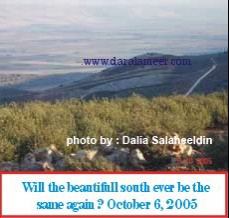 aid. We were standing at the wall of an open courtyard overlooking a vast expanse of the beautiful rugged landscape so typical of the south of Lebanon. He said it with the quiet but deep passion that only someone who had to fight and risk his life for the freedom of his land can feel. I watched him as his eyes lovingly caressed the mountains he had fought for only a few years back
aid. We were standing at the wall of an open courtyard overlooking a vast expanse of the beautiful rugged landscape so typical of the south of Lebanon. He said it with the quiet but deep passion that only someone who had to fight and risk his life for the freedom of his land can feel. I watched him as his eyes lovingly caressed the mountains he had fought for only a few years back
In Lebanon, the South is a passion. It represents more than its breathtaking scenery. It also represents suffering followed by victory, pride, and dignity, after the withdrawal of the Israeli army in 2000. Hizbullah, for many Arabs and Muslims, is much more than the dark unknown militant group that the rest of the world believes it to be. Whatever reservations some may have over its actions and ideology, the party remains an assurance that dignity can be preserved and oppression can be fought against successfully
In October 2005, I flew to Lebanon with some friends to attend a media conference organized by the Lebanese American University. However, I arrived in Lebanon with much more than just the conference in mind. I wanted to visit the Palestinian refugee camps in Beirut, as well as the site of the 1982 Sabra and Shatilla massacres. Even more so, I wanted to see the South
We contacted a Hizbullah member in one of their academic research centers, hoping that they would consider taking us on a special trip to the South. It was Ramadan, making this possibility even more remote, as most Muslims prefer to stay home with their families during the month of Ramadan
What if they were too busy (as was to be expected)? What if they couldn't take us for some security reason? After all, given its recent history, the South was not a place a foreigner just hopped into a taxi and went to … especially not the unpredictable border
They agreed to take us. So there we were on October 6, [1] heading for the south of Lebanon, escorted by two Hizbullah members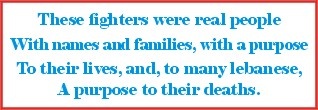
We briefly introduced ourselves. Qasim, [2] who was driving, was generally quiet, with a friendly smile and a ready laugh. The dark blond Ayyub laughed and said, "I'm your protection on this trip," and showed us the gun he was carrying in the glove compartment. The possibility of the need for protection had never crossed my mind until that moment
The steep roads with their sharp, sudden turns in the mountainous South are not the smoothest in the world. At times we felt as if we were on a roller coaster ride, causing both our guides to continually apologize for any discomfort we might have
Along the way, we stopped several times at huge billboards commemorating the scene of a bombing operation against Israeli troops. These billboards had the picture of the Hizbullah fighter who had carried out the operation, his full name, and details about the operation itself. These fighters were real people with names and families, with a purpose to their lives, and, to many Lebanese, a purpose to their deaths
Our guides pointed out unmarked spots where other resistance operations were carried out, speaking of the war against Israel with an intimacy only those who had played an active role in it could
These were once paths on which soldiers from both sides and Israeli tanks and Hizbullah trucks had passed. Five years after the Israeli withdrawal, the paths had once again returned to their original state of perfect picnic spots. An occasional mountain creek would peep through the rocks, and Qasim and Ayyub pointed out the various kinds of trees and plants
Testimony to Horrors … and Love
Located near the cities of Nabatiyeh and Khiam, the Khiam Detention and Interrogation Camp was originally built by the French in the 1930s as a military barrack complex. It was later turned into a detention and interrogation camp used by the Israelis from 1985 until 2000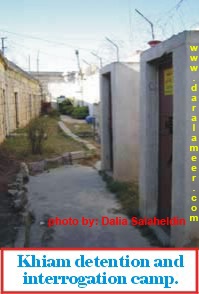
Hizbullah has carefully preserved it as a testimony to the still-vivid horrors the site witnessed. We were given a tour by the caretaker, who himself was once a detainee
Passing through the dark airless rooms in which Lebanese civilians as well as resistance fighters were crammed, we stopped to read the names and words etched on the walls
Each name represented that once upon a time, not so very long ago, there was a person, just like anyone, with a name, a life, a family. Some of the writings on the walls were verses from the Qur'an and sayings about oppression and patience in the face of suffering. Some were snatches of poetry telling the love story the detainees shared with southern Lebanon
The caretaker showed us the interrogation rooms, the guards' dormitories, and the impossibly tiny solitary confinement cells in which a child would barely fit, let alone a full-grown adult. But then again, the Israeli army had incarcerated children as well as entire families, a crime documented by a Human Rights Watch report in 1999
The Israelis would torture us psychologically as well as physically," the caretaker told us, showing us the women's cells
A man can stand to be tortured, can stand anything, but to hear your sister or wife or mother screaming …" Ayyub left his sentence unfinished, his voice trailing off
We stopped for a moment to take in the surrounding sweep of mountainous landscape. Looking at the scene, I understood Ayyub's professed passion for the South. I had seen enough of Lebanon and its people to love the country. The hard-fought freedom of the South made it all the more precious
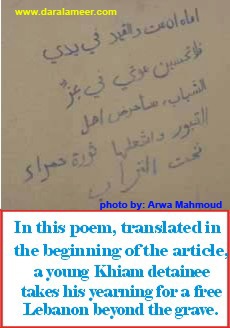 At Fatima's Gate
At Fatima's Gate
The sun reminded us that in a few hours we would have to break our fast, so we took our leave of Khiam's caretaker and forged ahead to our next destination: Fatima's Gate
Fatima's Gate is a stretch of border fence near which orange groves grew on the Israeli side. On the Lebanese side, a road that was closed to any traffic was bordered by villas, some still being built, a sign of security, Ayyub assured me. After all, no one would dare build a house so close to the border if there was any danger
Today, as I hear the news of the bombing of Lebanon, I wonder how many of those houses and villas are still standing. I wonder what the people who once lived there waking up to the sight of Israeli orange groves are seeing every morning these days. I wonder if they will ever feel secure enough to go back to their demolished houses and have the energy to rebuild them and their lives
No Rest in Death
Seeing us falling in love with their land and possibly amused at our wide-eyed enthusiasm on the trip, Qasim and Ayyub took us to a place not many visitors to the South visited, or so they told us. It was called El-Abbad, or the Worshiper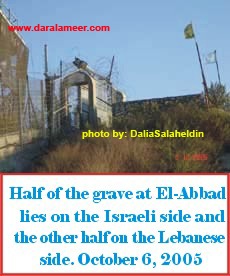
Located on a rocky hill, El-Abbad is the grave of a pious man, known simply as The Worshiper. It is a small concrete monument, only slightly raised from ground level
The Israelis don't even leave the dead in peace," Ayyub said, pointing at the fence that divided even the grave in two. A fairly sizeable Israeli military post with a huge visible camera lens was situated directly behind the border fence. We could hear Israeli soldiers talking in the bunker
The long-dead worshiper slept within a rather uneasy triangle of troops. On the Lebanese side, a UN flag was fluttering in the wind, and my camcorder caught sight of UN forces playing football. Next to the UN base was a Hizbullah watchtower, with at least two fighters stationed. Our guides stopped and greeted them, and we asked them if we could take a picture. A burly fighter on guard greeted us with a smile and politely told us that we couldn't and so we moved on
I cannot remember where we stopped to throw rocks at the Israeli border, but I know that at least we tried. It seems that everyone who visits the South feels compelled to perform this ritual, just as the pilgrims in Hajj throw stones at the pillars symbolizing the devil
It might have been that Egypt and Egyptians, now under a peace treaty with Israel, had grown soft over the years, but the only ones in our group who had enough muscle power to throw the rocks far enough to actually hit the fence were the Hizbullah members
Breaking Bread With Hizbullah
The sun was threatening to set, and our guides hurried us on. They were discussing the various merits of some restaurants, trying to decide where we would break our fast
We have to get to Tyre for iftar," Qasim said, maneuvering the car so that once again we found ourselves trying to hold on to anything to avoid getting bruised. "Is there any food you are particularly interested in
Uh oh. I had to tell them I don't eat red meat, a preference that usually singles me out as an anomaly in the meat-loving Arab world. Although I was embarrassed to confess this small detail to people who had witnessed the horrors of war, they took it in stride, and courteous as ever, adjusted their plans to suit my preference
We arrived in Tyre just in time. Typical of Arab hospitality, our hosts ordered what seemed to be two of every dish that had no red meat in it, and we broke our fast that day in a seaside restaurant with two members of Hizbullah
True to their Lebanese nature, their talk during the meal was light and mainly focused on the food and how the fattoush salad was a staple on every dinner table in Lebanon. Unable to contain ourselves, we had another agenda for the conversation
So … what was it like, the war?" I asked Qasim, who was passing me the hummus for what seemed to be the umpteenth time
He smiled, flustered at my forthright question, and slightly nodded his head towards an occupied table in the corner of the restaurant. "We'll talk later about this, OK
I hadn't meant to embarrass him, but I accepted his promise that they would answer our questions about the war on our way back to Beirut
The End of a Dream
Speeding through the darkness towards Beirut's lights that night, we listened to Qasim and Ayyub as they remembered the war. They told us of spending nights alone in a cave while on duty. They told us of ambushes and of friends killed, and how difficult it was to watch that happen. They told us that the true heroes of the war were the wives and families of the fighters and the people of the South. Their stories were punctuated sometimes by thoughtful silences, and other times by laughter at our struggle to understand every word of their heavy Lebanese accents
of friends killed, and how difficult it was to watch that happen. They told us that the true heroes of the war were the wives and families of the fighters and the people of the South. Their stories were punctuated sometimes by thoughtful silences, and other times by laughter at our struggle to understand every word of their heavy Lebanese accents
It was the end of a long day, but despite my exhaustion, I was trying to savor every moment. The South of Lebanon was the scene of a dream come true for me, but like all dreams, it had to come to an end. We said good-bye to our guides with a catch in our voices
Until July 13, 2006, less than one year after that tour of the South, I believed that one day I would return. I had even planned a future trip back to Lebanon with two of my friends. We promised each other we would read Robert Fisk's book Pity the Nation and then revisit the country. We started to dream of the South again
Now the names of the places I visited are listed as targets of the Israeli bombardment. I wonder how many of the mountain villages we passed through have been demolished. I wonder if any of the people I met and saw on the trip were killed. I wonder what happened to the friendly caretaker at Khiam now that the carefully preserved detention camp has been hit
Tyre, the ancient Phoenician city that was declared a World Heritage Site by UNESCO in 1979, has also been repeatedly targeted. I watch the bombs fall on my TV screen and wonder if the restaurant in which we broke bread with Hizbullah is still standing. I look at pictures and watch recordings of the trip and wonder what all those places look like now and wonder about the fates of the people we met and saw
now spend my days glued to the TV trying to make out the faces of the victims, praying that I never see the face of a friend. I call those who are still reachable by phone and hear strength and resolve coupled with exhaustion. Their voices have none of the customary joy they once had
Once upon a time, my dream to visit Lebanon came true. Do I dare to dream that it can happen again? Do I dare dream that Lebanon can be rebuilt and that we will one day find ourselves heading for another tour of the South with Qasim and Ayyub? Are they still alive
More importantly, would any of the dreams of the beautiful people of this beautiful country ever come true now? Are they still dreaming
Marwa Elnaggar is a writer, poet, and the Managing Editor of the Discover Islam section in IslamOnline.net. She has a masters degree in English and Comparative Literature and teaches Qur'an on a volunteer basis in Cairo, Egypt
1] As an Egyptian, October 6 is a special day in that it marks the anniversary of Egypt's 1973 crossing of the Suez Canal, which was a prelude to Israel's withdrawal from occupied Sinai. It is a day of liberation and victory in the minds of many Egyptians
2] For security reasons, the names of the Hizbullah members I mention here are not their real names
* First published in IslamOnline.net
The articles posted on this site represent the opinions of their authors. Dar Al Amir does not necessarily endorse them |



